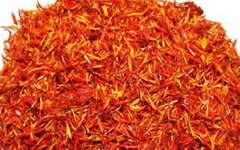Honghua (拉丁学名:Carthamus tinctorius L.), also known as Safflower, is a plant belonging to the Asteraceae family. The dried tubular flowers are orange-red, with narrow flower tubes that split into five lobes at the tip. The lobes are linear, and the yellow anthers are fused into a tube that extends beyond the lobes, with a central stigma protruding. It has a distinctive fragrance and a slightly bitter taste. The best quality is characterized by long petals, bright red color, and soft texture. It is primarily produced in regions such as Henan, Hunan, Sichuan, Xinjiang, and Tibet.
The effects and functions of Honghua include: invigorating blood circulation and regulating menstruation, dispersing blood stasis and alleviating pain; it is used for amenorrhea, dysmenorrhea, and retained lochia; it addresses masses and lumps, and injuries from falls; it is also used for varicose veins, peripheral neuritis, promoting blood circulation, and treating symptoms such as numbness or cyanosis in the legs due to blood stasis; the oil from Honghua seeds can lower blood lipids and serum cholesterol; it softens and dilates arteries, prevents atherosclerosis, and increases blood circulation; it regulates the heart and endocrine system.
Side effects of Honghua:
Modern medical research has confirmed that long-term use of Honghua can cause severe damage to the nervous, urinary, and digestive systems, accompanied by adverse reactions such as skin allergies and anaphylactic shock. Symptoms may include: headaches, rashes, nausea, urticaria, acne, heat signs, constipation, dizziness, facial flushing, menstrual irregularities, fatigue, lower abdominal pain, excessive menstrual bleeding, hematemesis, hematuria, urinary retention, gastrointestinal bleeding, bloody diarrhea, coma, altered consciousness, seizures, delirium, and rapid, weak pulse.

